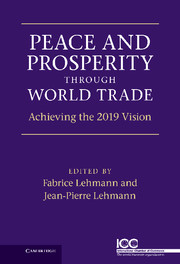Book contents
- Frontmatter
- Contents
- Notes on contributors
- Foreword
- Preface: the ICC vision
- Historical overview and dynamics
- Editorial note
- A Global systemic transformations
- B Governance of global trade
- C Poverty and global inequities
- D The long view on interlocking crises
- E Global business responsibilities
- Editorial introduction
- E1 Responsible leadership
- E2 For great leadership
- E3 A lesson on trade, regulation and competition policy?
- E4 International trade and business ethics
- E5 Who's driving twenty-first century innovation? Who should?
- E6 Responsible sourcing
- E7 Trade, international capital flows and risk management
- E8 Trade, corporate strategies and development
- E9 How can trade lead to inclusive growth?
- E10 Trade and human rights: friends or foes?
- E11 Trade: the spirit and rule of law
- Conclusion: the imperative of inclusive global growth
- Index
E2 - For great leadership
Published online by Cambridge University Press: 05 July 2011
- Frontmatter
- Contents
- Notes on contributors
- Foreword
- Preface: the ICC vision
- Historical overview and dynamics
- Editorial note
- A Global systemic transformations
- B Governance of global trade
- C Poverty and global inequities
- D The long view on interlocking crises
- E Global business responsibilities
- Editorial introduction
- E1 Responsible leadership
- E2 For great leadership
- E3 A lesson on trade, regulation and competition policy?
- E4 International trade and business ethics
- E5 Who's driving twenty-first century innovation? Who should?
- E6 Responsible sourcing
- E7 Trade, international capital flows and risk management
- E8 Trade, corporate strategies and development
- E9 How can trade lead to inclusive growth?
- E10 Trade and human rights: friends or foes?
- E11 Trade: the spirit and rule of law
- Conclusion: the imperative of inclusive global growth
- Index
Summary
Two lessons, among others, stand out from the experience of the 2008–2009 financial crisis. The crisis has shown that greed can lead to ruin, not only of persons but also of institutions. It has also shown that an uncritical faith in what is perceived as ‘brightness’ is no prescription for achieving the best results.
On the issue of greed, it is important to recall Max Weber (1864–1920), the noted German sociologist, who wrote The Protestant Ethic and the Spirit of Capitalism. In this celebrated book, Weber does not equate ‘the spirit of (modern) capitalism’ with the reign of unscrupulousness in the pursuit of material interests. He sees this ‘spirit’ instead in the ethos of industry, frugality, punctuality, and honest dealings in the pursuit of increasing one's capital. Weber traces this attitude of making money to the idea of a ‘calling’, an idea that defines a life-task in a given field of activity. Such an idea was, he argues, present predominantly in the Western world among the Protestant people. For the saints, so ran the belief in ascetic Protestantism, the everlasting rest belonged not to this world but to the next. On Earth, man must do the work of God who sent him here. In his own lifetime, Weber saw how the idea of duty in one's calling had been reduced to the ghost of dead religious beliefs. The pursuit of wealth, stripped of its religious and ethical meaning, had become an indulgence in ‘mundane passions’.
- Type
- Chapter
- Information
- Peace and Prosperity through World TradeAchieving the 2019 Vision, pp. 242 - 244Publisher: Cambridge University PressPrint publication year: 2010

